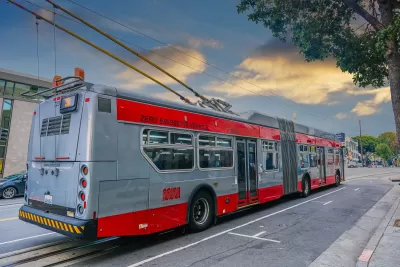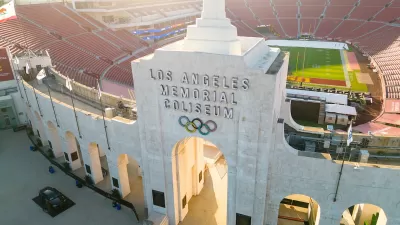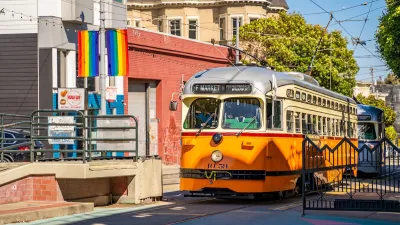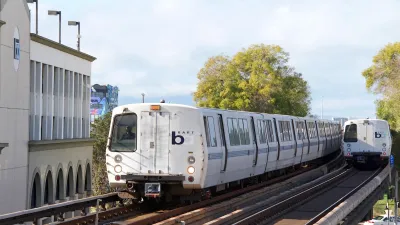To decarbonize its bus system, a new study recommends adding more substantial battery packs to the city’s historic—and all-electric—trolley bus fleet rather than replacing trolley buses with electric buses that require lengthy charging periods.

“Combining battery technology with existing trolley bus infrastructure is the best way for San Francisco to achieve zero emissions and a robust transit service, according to a study released Wednesday by The Climate and Community Project.” Writing in Streetsblog San Francisco, Roger Rudick outlines the report’s findings.
The report recommends adding In Motion Charging (IMC) technology and expanding its entire trolley bus fleet as the fastest and most efficient option for reducing carbon emissions. “However, SFMTA is also looking at replacing historic trolley-bus lines with … battery buses, even though trolley-buses already use zero-emission technology, powered by overhead wire.”
Rudick notes that “This seems to echo the historical error made by San Francisco and other American cities after WWII when they removed electric rail and trolley bus systems and replaced them with diesel buses.”
San Francisco Electrical Construction Industry Research & Advocacy Director Alex Lantsberg says battery-powered buses will have to spend more time out of the system charging, meaning the city will need more of them to provide effective service. “In addition, buses have to expend more energy accelerating when they carry heavy battery packs. And battery-only buses will do more damage to roads because they are heavier.”
Ultimately, Rudick writes, “the idea is to leverage and expand, rather than remove, the existing overhead trolley wire network. That will allow the city to reach zero emission transit more quickly than buying thousands of untested battery-only buses, many of which would just replace buses that are already zero-emission vehicles.”
FULL STORY: Study: Trolley Buses with Batteries are the Best Path to Zero Emissions

Alabama: Trump Terminates Settlements for Black Communities Harmed By Raw Sewage
Trump deemed the landmark civil rights agreement “illegal DEI and environmental justice policy.”

Planetizen Federal Action Tracker
A weekly monitor of how Trump’s orders and actions are impacting planners and planning in America.

Why Should We Subsidize Public Transportation?
Many public transit agencies face financial stress due to rising costs, declining fare revenue, and declining subsidies. Transit advocates must provide a strong business case for increasing public transit funding.

Understanding Road Diets
An explainer from Momentum highlights the advantages of reducing vehicle lanes in favor of more bike, transit, and pedestrian infrastructure.

New California Law Regulates Warehouse Pollution
A new law tightens building and emissions regulations for large distribution warehouses to mitigate air pollution and traffic in surrounding communities.

Phoenix Announces Opening Date for Light Rail Extension
The South Central extension will connect South Phoenix to downtown and other major hubs starting on June 7.
Urban Design for Planners 1: Software Tools
This six-course series explores essential urban design concepts using open source software and equips planners with the tools they need to participate fully in the urban design process.
Planning for Universal Design
Learn the tools for implementing Universal Design in planning regulations.
Caltrans
Smith Gee Studio
Institute for Housing and Urban Development Studies (IHS)
City of Grandview
Harvard GSD Executive Education
Toledo-Lucas County Plan Commissions
Salt Lake City
NYU Wagner Graduate School of Public Service





























